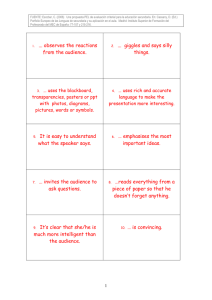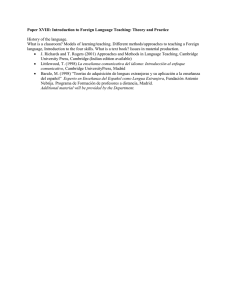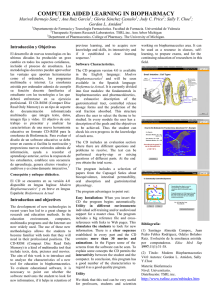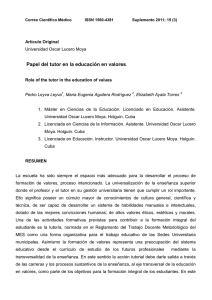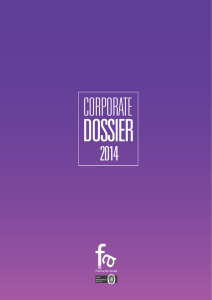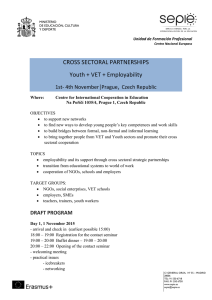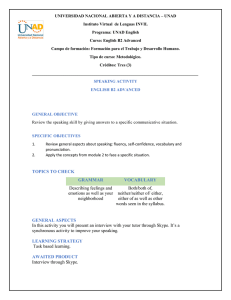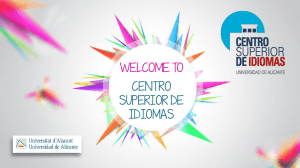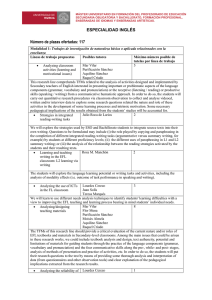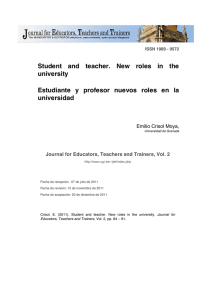MÁSTER Universitario en Formación del Profesorado de Educación
Anuncio
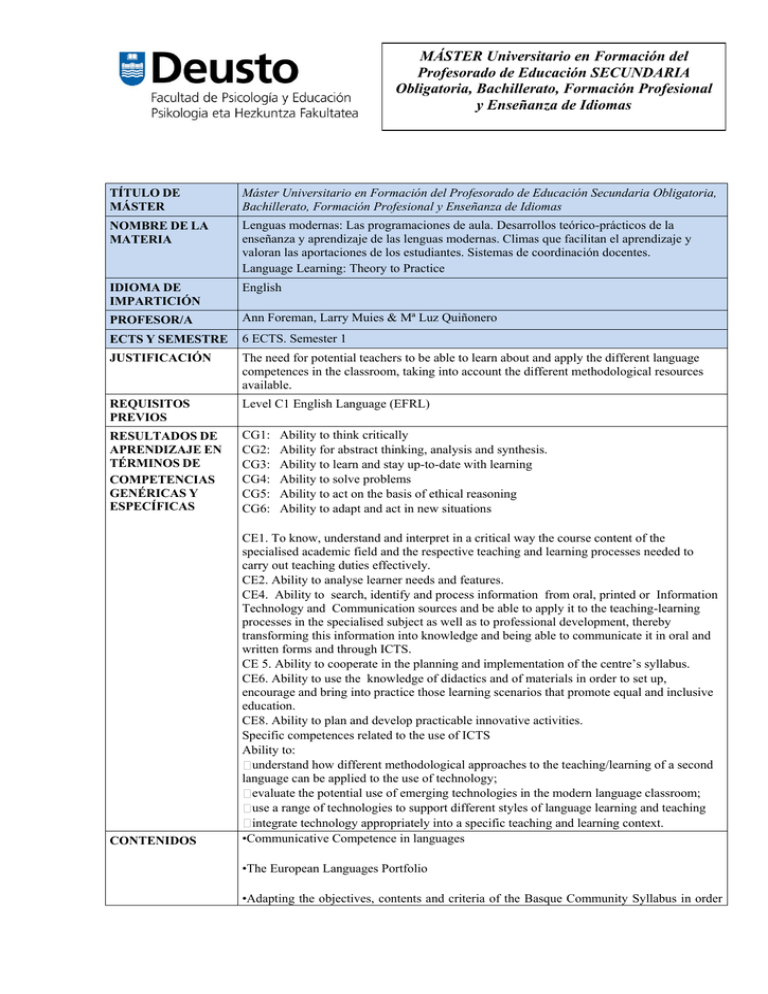
MÁSTER Universitario en Formación del Profesorado de Educación SECUNDARIA Obligatoria, Bachillerato, Formación Profesional y Enseñanza de Idiomas TÍTULO DE MÁSTER Máster Universitario en Formación del Profesorado de Educación Secundaria Obligatoria, Bachillerato, Formación Profesional y Enseñanza de Idiomas NOMBRE DE LA MATERIA Lenguas modernas: Las programaciones de aula. Desarrollos teórico-prácticos de la enseñanza y aprendizaje de las lenguas modernas. Climas que facilitan el aprendizaje y valoran las aportaciones de los estudiantes. Sistemas de coordinación docentes. Language Learning: Theory to Practice IDIOMA DE IMPARTICIÓN English PROFESOR/A Ann Foreman, Larry Muies & Mª Luz Quiñonero ECTS Y SEMESTRE 6 ECTS. Semester 1 JUSTIFICACIÓN The need for potential teachers to be able to learn about and apply the different language competences in the classroom, taking into account the different methodological resources available. REQUISITOS PREVIOS Level C1 English Language (EFRL) RESULTADOS DE APRENDIZAJE EN TÉRMINOS DE COMPETENCIAS GENÉRICAS Y ESPECÍFICAS CG1: CG2: CG3: CG4: CG5: CG6: CONTENIDOS CE1. To know, understand and interpret in a critical way the course content of the specialised academic field and the respective teaching and learning processes needed to carry out teaching duties effectively. CE2. Ability to analyse learner needs and features. CE4. Ability to search, identify and process information from oral, printed or Information Technology and Communication sources and be able to apply it to the teaching-learning processes in the specialised subject as well as to professional development, thereby transforming this information into knowledge and being able to communicate it in oral and written forms and through ICTS. CE 5. Ability to cooperate in the planning and implementation of the centre’s syllabus. CE6. Ability to use the knowledge of didactics and of materials in order to set up, encourage and bring into practice those learning scenarios that promote equal and inclusive education. CE8. Ability to plan and develop practicable innovative activities. Specific competences related to the use of ICTS Ability to: understand how different methodological approaches to the teaching/learning of a second language can be applied to the use of technology; evaluate the potential use of emerging technologies in the modern language classroom; use a range of technologies to support different styles of language learning and teaching integrate technology appropriately into a specific teaching and learning context. •Communicative Competence in languages Ability to think critically Ability for abstract thinking, analysis and synthesis. Ability to learn and stay up-to-date with learning Ability to solve problems Ability to act on the basis of ethical reasoning Ability to adapt and act in new situations •The European Languages Portfolio •Adapting the objectives, contents and criteria of the Basque Community Syllabus in order MÁSTER Universitario en Formación del Profesorado de Educación SECUNDARIA Obligatoria, Bachillerato, Formación Profesional y Enseñanza de Idiomas to design ESO and Bachillerato programmes. •Developing the basic competences starting from teaching foreign languages. •Activities favouring competences development. •Group dynamics and classroom organisation that favour the teaching-learning process. •Dealing with diversity in language classrooms •Learning styles and strategies •Analysis of programming lesson-plans. The ICT module of the course will cover the following topics: the current debate on the use of ICT in language teaching and learning. the internet as an authentic resource for language learning the impact and role of technology on the learning environment the design of class activities, task and projects using new technology the development of learner autonomy ESTRATEGIAS DE ENSEÑANZA APRENDIZAJE the use of social media/networks and mobile devices in the learning and teaching context Carry out lesson planning adapted to learner characteristics and needs (CE2) (CG6) (CG2). Design teaching-learning situations that work on theoretical aspects of the subject and their transfer to practical life situations (CE2) (CG2), and which favour equal education including diversity(CE6) (CG5). Carry out a work task in coordination with other subjects in order to develop the basic competences (CE12, CE5) (CG2). Design activities bearing in mind learner characteristics, motivation and abilities as well as the difficulties these activities suppose (CE8) (CG6). Develop activities in compliance with learner diversity needs (CE 6) (CG5). Promote self-assessment habits in learners in order to favour effort and continuous improvement in learning (CG3) (CG5). Use ICTs to enable and support student learning (CE4). SISTEMA DE EVALUACIÓN •Active participation in class and in forum discussions on course website •Carrying out individual and group tasks: MÁSTER Universitario en Formación del Profesorado de Educación SECUNDARIA Obligatoria, Bachillerato, Formación Profesional y Enseñanza de Idiomas DOCUMENTACIÓN -Practicum observation reflections/conclusion -Designing a teaching programme -Proposals for group dynamics for a specific course. -Final task integrating module content and including practical proposals. -Reviewing and evaluating ICT resources and materials and presenting them to your classmates -Team-teaching a class activity that exploits new technology •The Basque Community Modern Languages Syllabus •Selected bibliography items •Materials designed and published by the Basque Government • Materials prepared in-house •The Common European Framework of Reference for Languages: Learning, teaching, assessment (CEFR): http://www.coe.int/t/dg4/education/elp/elpreg/cefr_EN.asp JOURNALS •ELT Journal •TESOL Quarterly •English Teaching Professional •Language Teaching
